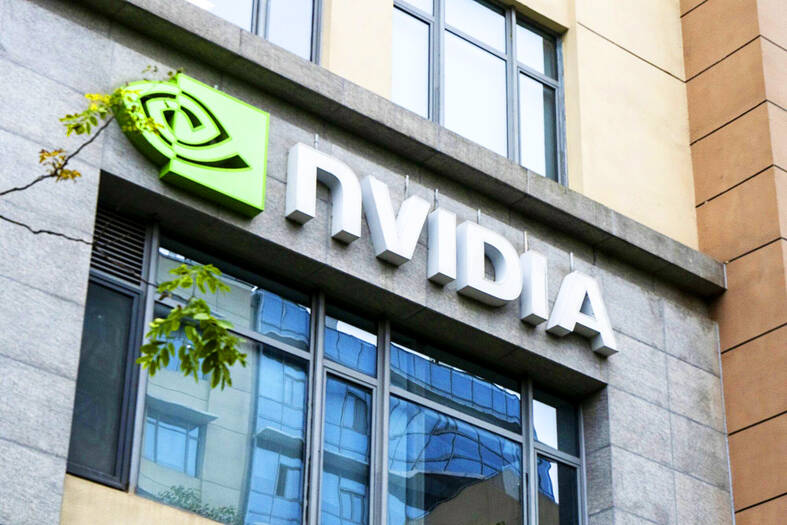Chip tester King Yuan Electronics Co (京元電子), which counts Nvidia Corp as its key customer, yesterday said it planned to spend a record NT$23.3 billion (US$712 million) on new facilities and equipment next year to catch up with rapidly growing testing service demand for chips used in artificial intelligence (AI) and high-performance computing (HPC).
The capital expenditures represent a surge of 68 percent compared with NT$13.8 billion this year.
Seventy percent of the spending would be allocated for the purchase of final chip testing equipment and related tools such as test handlers, the company said in a statement after its board of directors approved the annual capital spending.

Photo: Bloomberg
“As customers’ pressing demand for AI and HPC chip testing services grow fast, the company is striving to expand capacity quickly, allowing customers to launch new products soon,” King Yuan said.
To finance the facility and equipment spending, the board yesterday also gave the go-ahead to arrange a syndicated loan of NT$14 billion from First Commercial Bank (第一銀行), the company said in a separate statement.
King Yuan is adding new testing equipment and expanding capacity as Nvidia’s Blackwell GB200 chip enters volume production this quarter, and the new GB300 chip is in the pipeline. As chip design and chip manufacturing become more complicated, longer final testing processes are needed to ensure that chips meet functionality, reliability and quality requirements, the company said.
To cope with the sharp rise in demand, King Yuan said it has rented a factory shell in Miaoli County’s Toufen City (頭份) and is building a clean room and preparing for new equipment to move in.
It usually takes at least one year to complete construction, it said.
The company operates two fabs in Miaoli’s Jhunan (竹南) and Tongluo (銅鑼) townships.
The record-breaking capital spending came as the company expressed a bullish outlook about next year’s revenue growth, driven by the AI boom.
King Yuan said next year would be a “good year,” with revenue and gross margin likely to rise to an all-time high.
The growth would be mostly driven by AI applications, it said.
Other applications including chips used in smartphones, automobiles and industrial devices would be flat, it said.
The company reported an annual growth of 11 percent in revenue to NT$19.56 billion in the first three quarters of this year, compared with NT$17.65 billion in the same period last year. Gross margin rose to 34.82 percent from 32.97 percent a year earlier.
Net profit soared about 35 percent to NT$5.75 billion during the January-to-September period, compared with NT$4.27 billion a year earlier.

DIVIDED VIEWS: Although the Fed agreed on holding rates steady, some officials see no rate cuts for this year, while 10 policymakers foresee two or more cuts There are a lot of unknowns about the outlook for the economy and interest rates, but US Federal Reserve Chair Jerome Powell signaled at least one thing seems certain: Higher prices are coming. Fed policymakers voted unanimously to hold interest rates steady at a range of 4.25 percent to 4.50 percent for a fourth straight meeting on Wednesday, as they await clarity on whether tariffs would leave a one-time or more lasting mark on inflation. Powell said it is still unclear how much of the bill would fall on the shoulders of consumers, but he expects to learn more about tariffs

NOT JUSTIFIED: The bank’s governor said there would only be a rate cut if inflation falls below 1.5% and economic conditions deteriorate, which have not been detected The central bank yesterday kept its key interest rates unchanged for a fifth consecutive quarter, aligning with market expectations, while slightly lowering its inflation outlook amid signs of cooling price pressures. The move came after the US Federal Reserve held rates steady overnight, despite pressure from US President Donald Trump to cut borrowing costs. Central bank board members unanimously voted to maintain the discount rate at 2 percent, the secured loan rate at 2.375 percent and the overnight lending rate at 4.25 percent. “We consider the policy decision appropriate, although it suggests tightening leaning after factoring in slackening inflation and stable GDP growth,”

Meta Platforms Inc offered US$100 million bonuses to OpenAI employees in an unsuccessful bid to poach the ChatGPT maker’s talent and strengthen its own generative artificial intelligence (AI) teams, OpenAI CEO Sam Altman has said. Facebook’s parent company — a competitor of OpenAI — also offered “giant” annual salaries exceeding US$100 million to OpenAI staffers, Altman said in an interview on the Uncapped with Jack Altman podcast released on Tuesday. “It is crazy,” Sam Altman told his brother Jack in the interview. “I’m really happy that at least so far none of our best people have decided to take them

PLANS: MSI is also planning to upgrade its service center in the Netherlands Micro-Star International Co (MSI, 微星) yesterday said it plans to set up a server assembly line at its Poland service center this year at the earliest. The computer and peripherals manufacturer expects that the new server assembly line would shorten transportation times in shipments to European countries, a company spokesperson told the Taipei Times by telephone. MSI manufactures motherboards, graphics cards, notebook computers, servers, optical storage devices and communication devices. The company operates plants in Taiwan and China, and runs a global network of service centers. The company is also considering upgrading its service center in the Netherlands into a